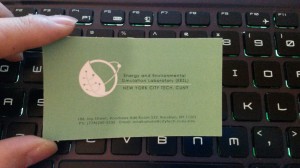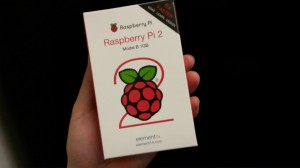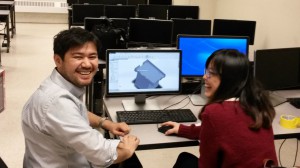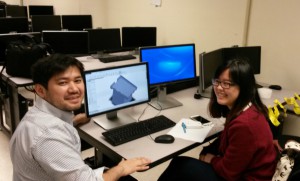We are installing an EESL High Performance Computing System for Environmental Simulation. Luca, one of our lead engineers, explains a server rail issue.
Monthly Archives: March 2015
Weekly update 3/22/2015
Weekly update 3/21/2015
[Research in City Tech’s Energy and Environmental Simulation Lab (EESL)]
Chris, one of our lead engineers, installed a speed reducer and solved a problem. Excellent job!!
Weekly update 3/20/2015
Tiffany, one of our industrial designers, created a 3D model of a new computer system used for controlling stepper motors and she explained it to Masa. It ready to go to a 3D printer. #raspberrypi #3DCAD #3Dprinter #sustainability
Great opportunities
Environmental Protection Agency STAR Fellowship: The purpose of the STAR (Science to Achieve Results) fellowship program is to encourage promising students to obtain advanced degrees and pursue careers in an environmental field. This goal is consistent with the immediate and long term mission of the Environmental Protection Agency, to protect public health and the environment. The STAR fellowship program has proven to be beneficial to both the public and private sectors by providing a steady stream of well-trained environmental specialists to meet society’s environmental challenges. It has also provided new environmental research in physical, biological, health and social sciences, and engineering.
Eligible academic fields: Environmental Engineering; Atmospheric Sciences; Environmental Chemistry and Environmental Materials Science; Hydrogeology; Economics; Environmental Decision-Making Research; Urban/Regional Planning and Geography; Microbiology; Molecular Biology; Public Health Sciences; Human Health Risk Assessment; Aquatic Systems Ecology; Coastal and Estuarine Processes; Terrestrial Systems Ecology.
The fellowship provides up to $42,000 per year of support per fellow. This amount covers a monthly stipend of $2,083 for up to 12 months totaling $25,000 for the year, $5,000 for authorized expenses, and up to $12,000 for tuition and fees. Master’s level students may receive support for a maximum of two years. Doctoral students may be supported for a maximum of three years, usable over a period of five years.
Applicants must be US Citizens and Permanent Residents; Graduating Seniors; Recent Grads; Graduate Students.








